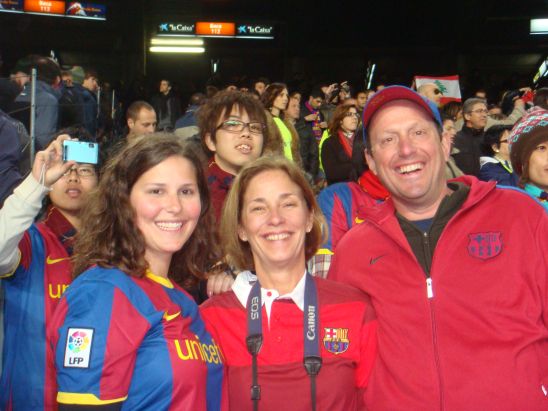Futbol is So Much More than Just Soccer in Spain


I cannot profess to be an expert on the subject, since I have never taken a cultural anthropology class in my life, but I have found that I notice the subtle idiosyncrasies after having lived here for six months. Anyhow, as I mentioned earlier, the depth of these differences was brought to my attention this past weekend in Barcelona.
Barcelona is an amazing city and I suggest it as a stop on anyone’s tour of Europe, but there was a much more important reason for choosing to go to Barcelona this particular weekend: futbol (known in the United States as soccer). F.C. Barcelona (Futbol Club Barcelona, colloquially known as Barça) was playing Zaragoza and my father got tickets. Prior to the game we stopped in a bar for a glass of wine and my dad asked the bartender about the other futbol team in Barcelona, Espanyol.
Futbol is So Much More than Just Soccer in Spain.
We hadn’t seen a single person wearing one of their jerseys, so he was wondering if anyone ever goes to the games. The bartender got quiet and then replied; “No, because they are the Castellano team.” Castellano is the formal name for the language that we know just as Spanish. In the region where Barcelona is the capital, Cataluña, Castellano is actually the second language. The first is Catalan, which sounds like a mixture of Spanish and French. As it turns out, Barça is a team owned by Catalonians and therefore the team is also Catalan (all the announcements were made in Catalan as well; it was a little confusing).
Espanyol, on the other hand, is a Castellano team, and as such, no one in the Catalan region supports them. Initially, this political statement via futbol struck me as odd, but then I started thinking about everywhere else I had traveled in the country and I realized how divided the regions actually are.
I do not mean to suggest that there is animosity between the regions of Spain, but rather that the regions each have their own culture and are very proud of that. The only obvious exception to that is the Basque region, which wants to secede from Spain and from whence comes the terrorist group ETA. Much of the individuality of the region comes in the food. Each region has special food that either you can only get in that region (like the pastel de carne in Murcia) or originates there (like paella in Valencia or gazpacho in Andalucía).
Futbol is So Much More than Just Soccer in Spain.
Although food is an excellent indicator of culture, there is much more involved. Each region has its own history. In fact, the history and culture of Spain that we all learned in European History in high school is actually mostly about Andalucía. Andalucía is where you find flamenco, guitar, and old Moorish fortresses (particularly the Alhambra in Granada). Murcia also has a history of Moorish inhabitants, but that history here is one of almost complete co-existence, even during the Reconquista and the Inquisition. The major war periods were previously, during Roman times.
Each region also has its own music, dances, and accent. Most of them also have another language, Valenicano in Valencia, Gallego in Galicia, Euskera in the Basque country and parts of Navarra, etc. As obvious, and perhaps unimportant as many of these differences may seem (there are different accents and foods in the United States too), they are of great significance here and have worked their way into all walks of life. In theatre, which is what I study, you can tell where a character is from without anyone having to mention it by the way that they talk or dress and what occupies their conversations.
Each region is preoccupied with a different political agenda and social issues, bringing up the tensions evinced by the Barça versus Espanyol debate in Barcelona. Therefore, you must be sure to choose your futbol team carefully; which team you support could mean a lot more than just an athletic rivalry.
Photo for Futbol is So Much More than Just Soccer in Spain by Sarah S.








